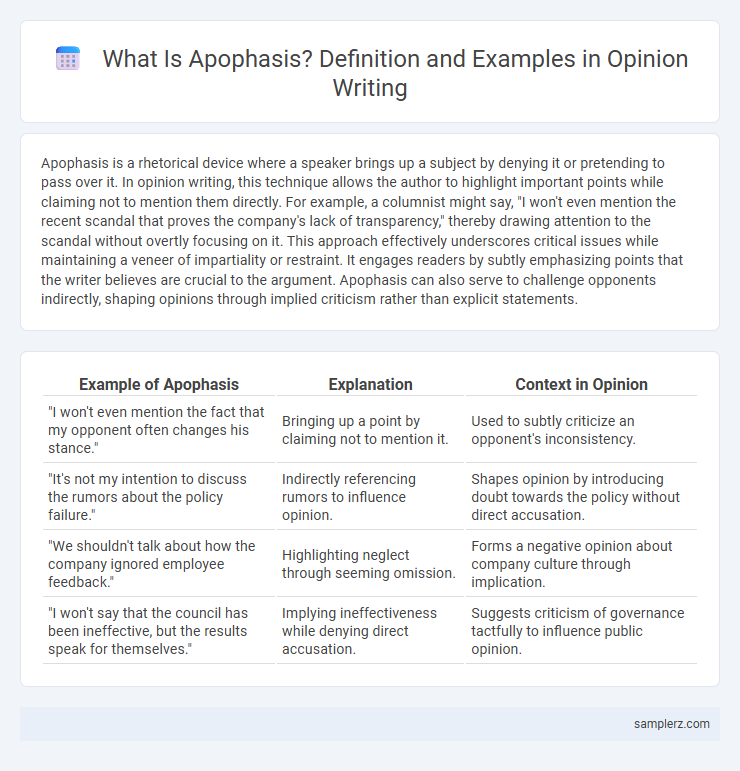Apophasis is a rhetorical device where a speaker brings up a subject by denying it or pretending to pass over it. In opinion writing, this technique allows the author to highlight important points while claiming not to mention them directly. For example, a columnist might say, "I won't even mention the recent scandal that proves the company's lack of transparency," thereby drawing attention to the scandal without overtly focusing on it. This approach effectively underscores critical issues while maintaining a veneer of impartiality or restraint. It engages readers by subtly emphasizing points that the writer believes are crucial to the argument. Apophasis can also serve to challenge opponents indirectly, shaping opinions through implied criticism rather than explicit statements.
Table of Comparison
| Example of Apophasis | Explanation | Context in Opinion |
|---|---|---|
| "I won't even mention the fact that my opponent often changes his stance." | Bringing up a point by claiming not to mention it. | Used to subtly criticize an opponent's inconsistency. |
| "It's not my intention to discuss the rumors about the policy failure." | Indirectly referencing rumors to influence opinion. | Shapes opinion by introducing doubt towards the policy without direct accusation. |
| "We shouldn't talk about how the company ignored employee feedback." | Highlighting neglect through seeming omission. | Forms a negative opinion about company culture through implication. |
| "I won't say that the council has been ineffective, but the results speak for themselves." | Implying ineffectiveness while denying direct accusation. | Suggests criticism of governance tactfully to influence public opinion. |
Defining Apophasis in Opinion Writing
Apophasis in opinion writing involves mentioning a subject by stating that it will not be discussed, effectively drawing attention through denial. It serves as a rhetorical strategy to emphasize a point subtly while feigning restraint. This technique strengthens arguments by provoking curiosity and encouraging readers to infer the implied critique or assertion.
Classic Examples of Apophasis in Editorials
Classic examples of apophasis in editorials include statements like "I won't even mention the numerous scandals that have plagued the administration," which subtly highlight issues by pretending to omit them. Editorial writers use apophasis to underscore controversial topics while maintaining an appearance of restraint or neutrality. This rhetorical strategy effectively draws readers' attention to taboo subjects without making direct accusations.
Apophasis: A Rhetorical Device in Political Commentary
Apophasis, a rhetorical device frequently used in political commentary, involves mentioning a subject by denying it will be discussed, thereby drawing attention to the topic indirectly. This technique enhances persuasive impact by subtly introducing controversial points without overtly stating them, which can influence public perception while maintaining plausible deniability. Political figures often employ apophasis to criticize opponents or highlight issues while appearing impartial or restrained.
How Apophasis Shapes Public Opinion
Apophasis subtly influences public opinion by highlighting issues while pretending to omit them, creating a sense of intrigue and emphasis. Politicians often use this rhetorical device to introduce controversial topics without direct accountability, shaping perceptions through suggestive omission. This technique manipulates audience focus, steering discussions and framing debates in a way that can alter collective attitudes and beliefs.
Not Saying, Yet Saying: Subtle Persuasion with Apophasis
Apophasis effectively persuades by stating that one will not mention a controversial issue, thus drawing attention to it indirectly. This rhetorical strategy allows speakers to imply criticism or praise without overtly expressing it, engaging the audience's imagination. Examples often appear in political speeches where the speaker claims not to attack an opponent while subtly casting doubt on their credibility.
Famous Opinion Pieces Featuring Apophasis
Famous opinion pieces employing apophasis skillfully draw attention to controversial topics by claiming not to mention them, thereby enhancing the rhetorical impact. For instance, Mark Antony's funeral speech in Shakespeare's "Julius Caesar" uses apophasis to subtly undermine Brutus while professing respect, illustrating the technique's power in persuasive writing. This rhetorical device remains a popular strategy in opinion journalism to engage readers by implying what is strategically left unspoken.
The Impact of Apophasis on Reader Perception
Apophasis, by implicitly addressing a topic while denying discussion, subtly influences reader perception through strategic omission and emphasis. This rhetorical device can create a sense of irony or skepticism, prompting readers to question the speaker's intentions and read between the lines. The impact of apophasis on reader perception lies in its ability to shape opinions indirectly, fostering engagement and critical thinking without overt argumentation.
Common Apophasis Techniques in Opinion Columns
Opinion columns frequently employ apophasis by ostensibly ignoring a controversial topic while subtly highlighting it, such as stating, "I won't even mention the recent scandal." Common apophasis techniques include denying the intention to criticize while actually delivering pointed critiques, and emphasizing what is supposedly off-limits to magnify reader attention. This strategy effectively influences public perception by allowing writers to introduce sensitive issues without direct confrontation.
Ethical Considerations of Apophasis in Journalism
Apophasis in journalism raises ethical considerations by subtly influencing public opinion while avoiding direct statements, often blurring the lines between fact and insinuation. This rhetorical strategy can undermine transparency, as it allows journalists to imply criticism or bias without explicit accountability. Ethical journalism demands clear communication, prioritizing truthfulness over manipulative suggestion to maintain audience trust.
Crafting Stronger Opinions Using Apophasis
Apophasis enhances opinions by emphasizing key points through strategic denial, allowing the speaker to highlight critical information without direct assertion. This rhetorical technique strengthens persuasion, making arguments more memorable and impactful by indirectly drawing attention to the topic. Crafting opinions with apophasis encourages readers to engage deeply, fostering critical thinking and nuanced understanding of the subject matter.

example of apophasis in opinion Infographic
 samplerz.com
samplerz.com